Revision and exams
What do you want to learn about?
Click on the links below to move to the corresponding section of this page:
Planning revision and assessment time

Revision timetables
Creating a revision timetable helps you use your revision time effectively. You can make it on paper and stick it somewhere you will see it every day, like above your desk, or create a digital calendar that you can easily refer to on your phone.
Start your revision early and use all the weeks until your assessments so that you aren’t just cramming at the last minute.
Follow these steps to produce a helpful revision timetable:
- Create a blank timetable covering all the days in the week and all the hours that you are awake.
- Mark on the hours of the week that you have fixed responsibilities, like classes, work, family commitments, etc. Schedule around these
- Consider other activities that you can do with more flexibility. These may include exercise, catching up with friends, housework and of course eating! Don’t put them into the timetable yet, but list them so you know what you will need to add.
- Do you work best in the mornings, afternoons or evenings? Think about the time of day when you are most productive and find it easiest to get motivated and remember information.
- Mark in the times that you will be revising based on your most focused time of day. Aim for 45-minute sessions with a 15-minute break in between.
- Incorporate your extra activities that have flexible timing around your revision sessions.
- Allow for extra time. It is important not to fill every slot in your study plan. As well as being overwhelming, you also need an element of flexibility - some topics may take longer than you anticipate, and other unexpected events may take up your time too.
- Now look at your revision sessions more closely. How many assessments do you have? Make a note of all your assessments and their dates. Work backwards from these dates to ensure you fit in enough revision time for each assessment.
- For each assessment write down a list of the main topics that should be covered. If you are unsure, look through Canvas, your module handbook or speak to your classmates.
- For each topic, think about how confident you currently are. Try rating your confidence between 1 and 5 (1 = low confidence, 5 = high confidence). Then dedicate more of your revision time to the topics where you have rated your confidence towards the lower end of the scale.
- At the end of each week, review your revision plan. What worked for you and what caused problems? Were you right about how long different activities took? You may need to adjust your plan or adjust how long you spend on certain tasks the following week.
- Finally, refer to the pages on Time Management for help on prioritising and scheduling all your tasks.
You can, if you prefer, download this revision template as a Word document or PDF as a guide to help you (Important: The PDF will open in this window so remember to click on the browsers back button to return to the Skills Hub).
Tavian talks about tips for revising
- Video transcript
Tavian: So some general tips around revising and how to manage your time. I think that's the most important. It's just finding out when you work the best. I find I work better later in the day, so I'll start my work, you know, maybe one, and then I'll work until eight. If I'm really in that mode, of OK, exam period. But it's super important. I kind of do 45 minutes and then 5, 10-minute break. I can't do much more than 45 minutes. My concentration just goes. And I think it's super important to, you know, just go for a walk here and there, make sure you're active do some exercise go to the pub when you've finished work. You need to have some sort of break - you can't just be, you know, for two weeks, I'm studying all day, every day and have nothing, you know, social, active, anything in between. Your life still needs to go on. But then, yeah, I mean, when you're working, make sure you're working and you're fully concentrated. So in first year, I had all of my exams in person, so I would make sure that I re-watched all of the lectures and re-read pretty much every chapter that was important for the exams. So I was super prepared, which was great. I think it was a little bit overkill. I don't think I needed to do that amount of preparation, but then the way that I'm tested now is very different since it's all take-away papers. I have 24 hours to write, say, a 1500-word report, so I don't need to have all of that knowledge memorised. I just need to know where it is and how to apply it. I think it's a better way of examining people. It's a lot more around, you know, how you can take the theory and apply it into a real-world situation as opposed to in first year, I felt that it was more 'What theory do you know?' So yeah, the way I've prepared for my exams has changed over the three years.
Planning your time for online assessments
Online assessments may continue to be part of life at Sussex for some courses.
For online assessments, you won't be sitting a paper in exam conditions, but you do still need to revise. You may not need to memorise specific information but it is still important to develop an in-depth awareness of the topic. There is not enough time when you receive your assessment questions to produce good quality answers if you are starting the process from scratch
It is likely that you will have staggered deadlines and time between receiving an assessment and having to submit your response. However, it doesn’t mean you should spend the whole time doing extensive research as you might for a piece of coursework or spend this amount of time writing an answer.
Make sure you know how many assessments are online and what their format is. You need to know when they are released and how long you have to complete them.
A five-step guide to planning your time for online assessments
Your School may provide you with more specific guidance on how to spend your time but the following steps provide an example of how you might plan ahead for your assessment period if you had 24 hours to hand in each written assessment.
Each tabbed step below has a graphic associated with it on how your calendar might look (for a text only version of this process please access the accordion below the guide).
Put in assessment release and submission dates
The first thing to go into your plan should be the dates and times you expect to receive your assessment and the deadlines when these need to be submitted.
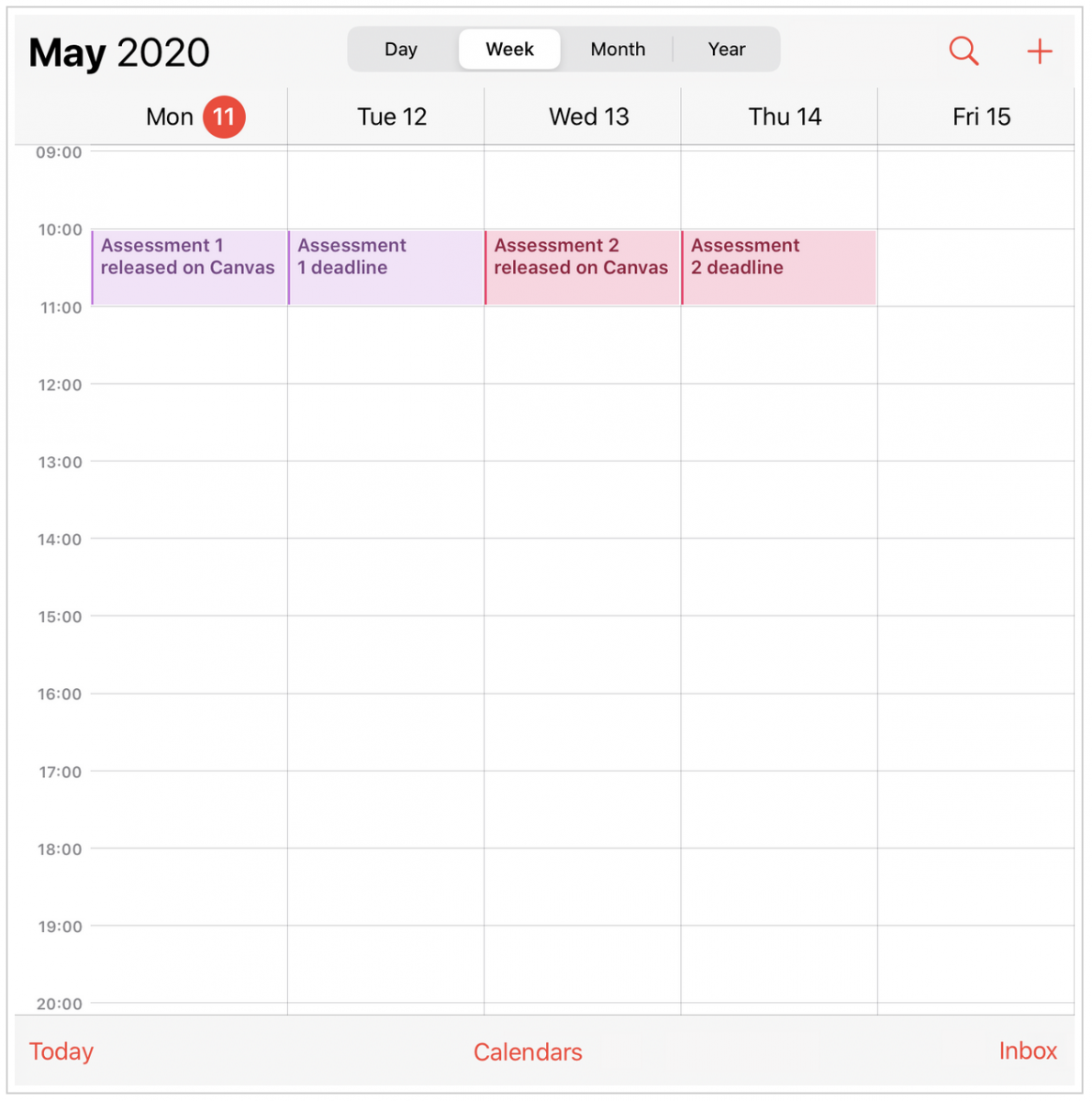
Add your other essential activities
Add the time you need for work, eating, exercise and other responsibilities and be realistic about the time you need to dedicate to these. You may also have other coursework deadlines to consider.
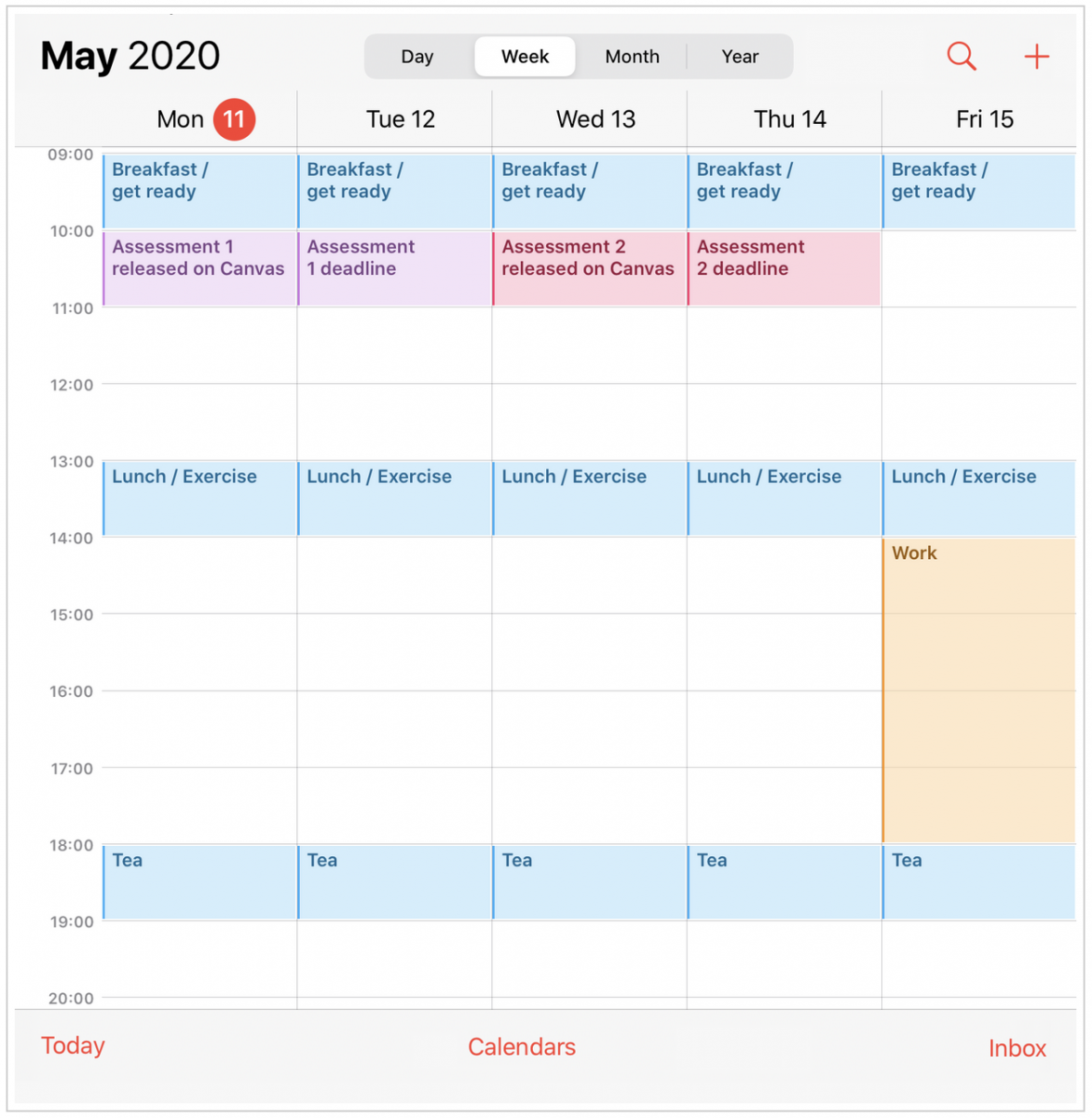
Add time to write your answer
You may have been provided with timings for how long to spend on writing the answer to each question, so add that in with enough time before the deadline.
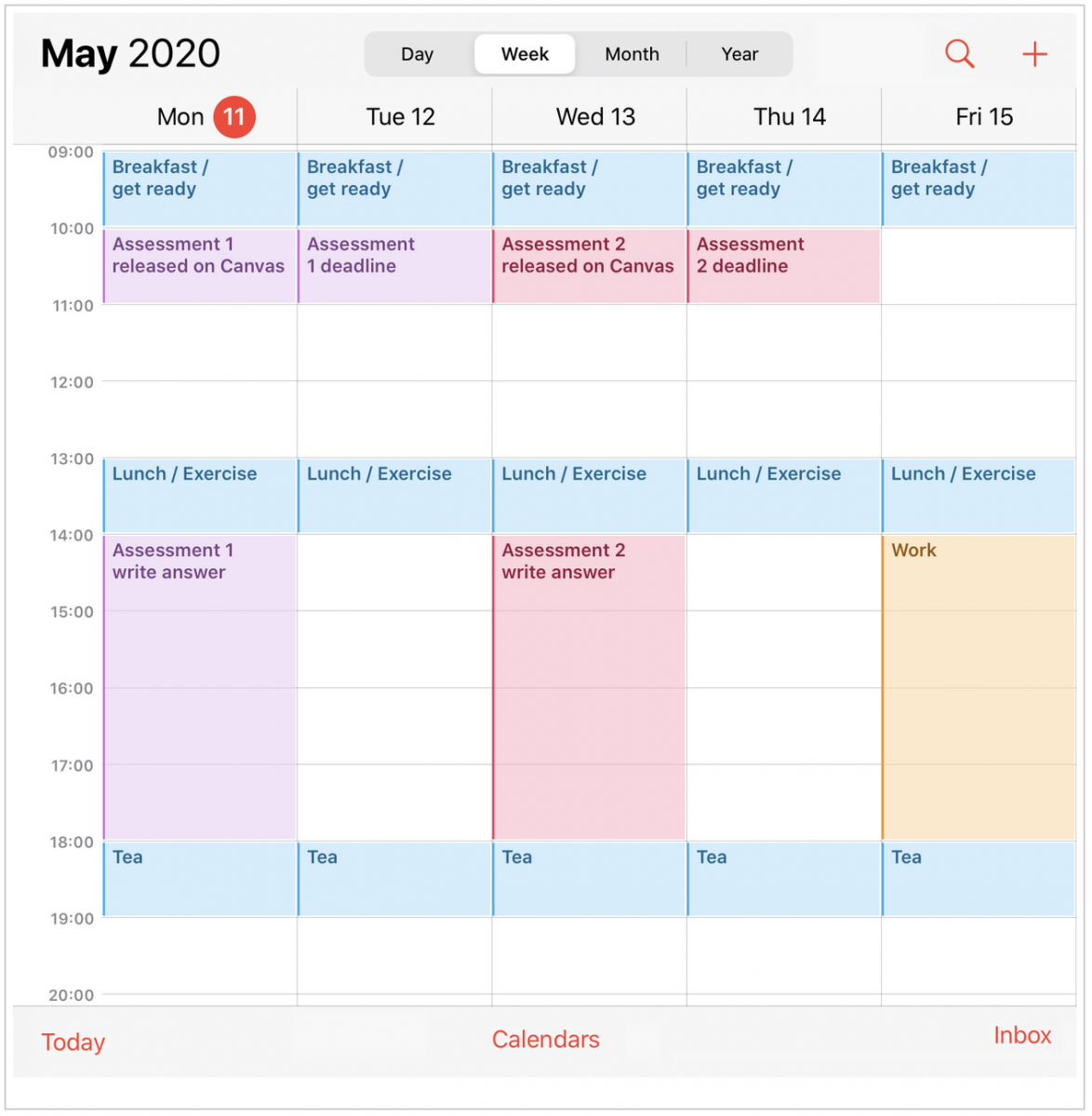
Add some planning time
Put aside some time to plan your answer and go through your notes. If you have prepared well in the weeks beforehand, this should not take too much time.
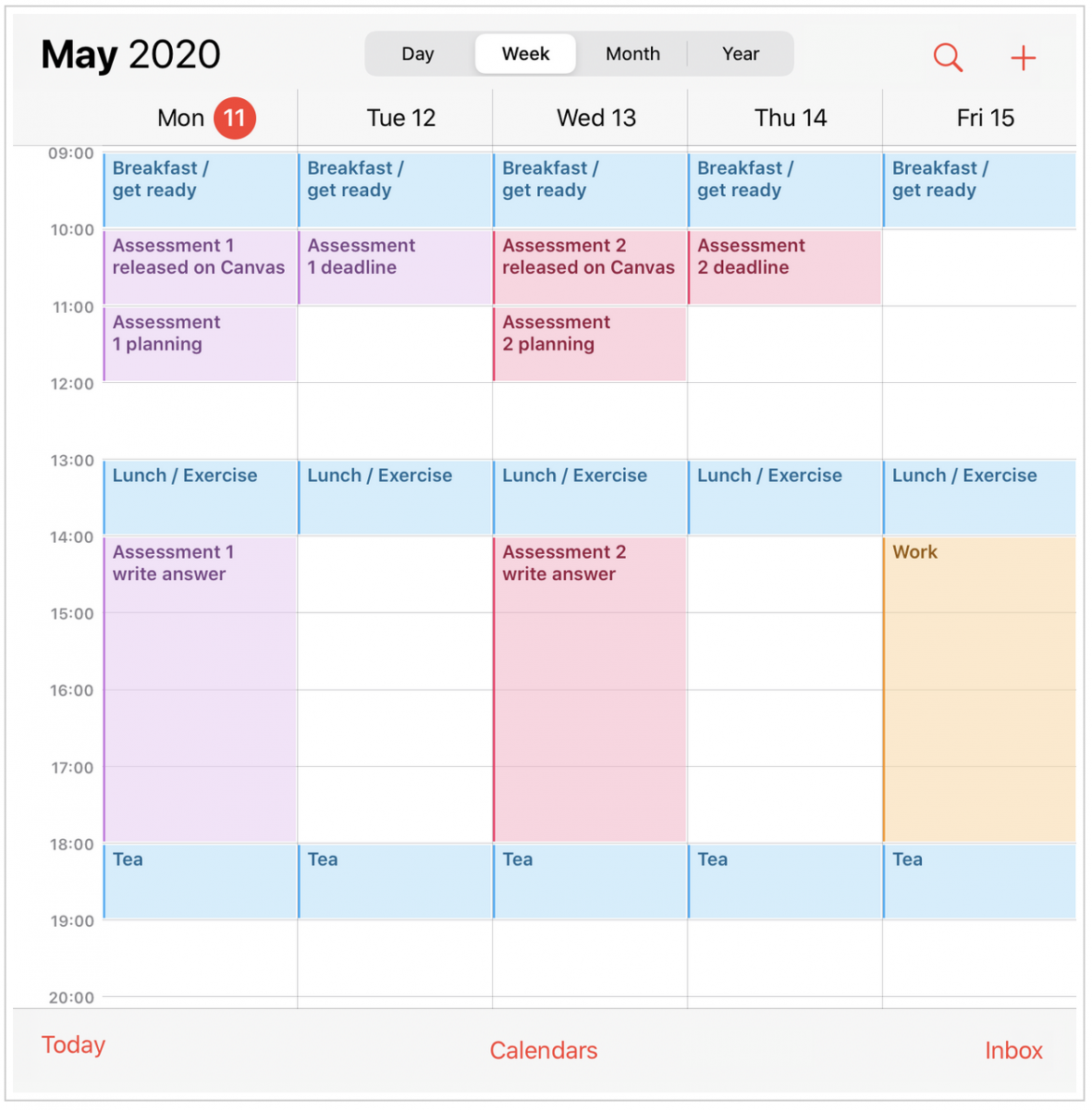
Allow time to proof-read
Take advantage of the time available to proofread your response before you submit it. Try not to leave the submission until the last possible minute and make sure you know who to contact if you have technical issues.
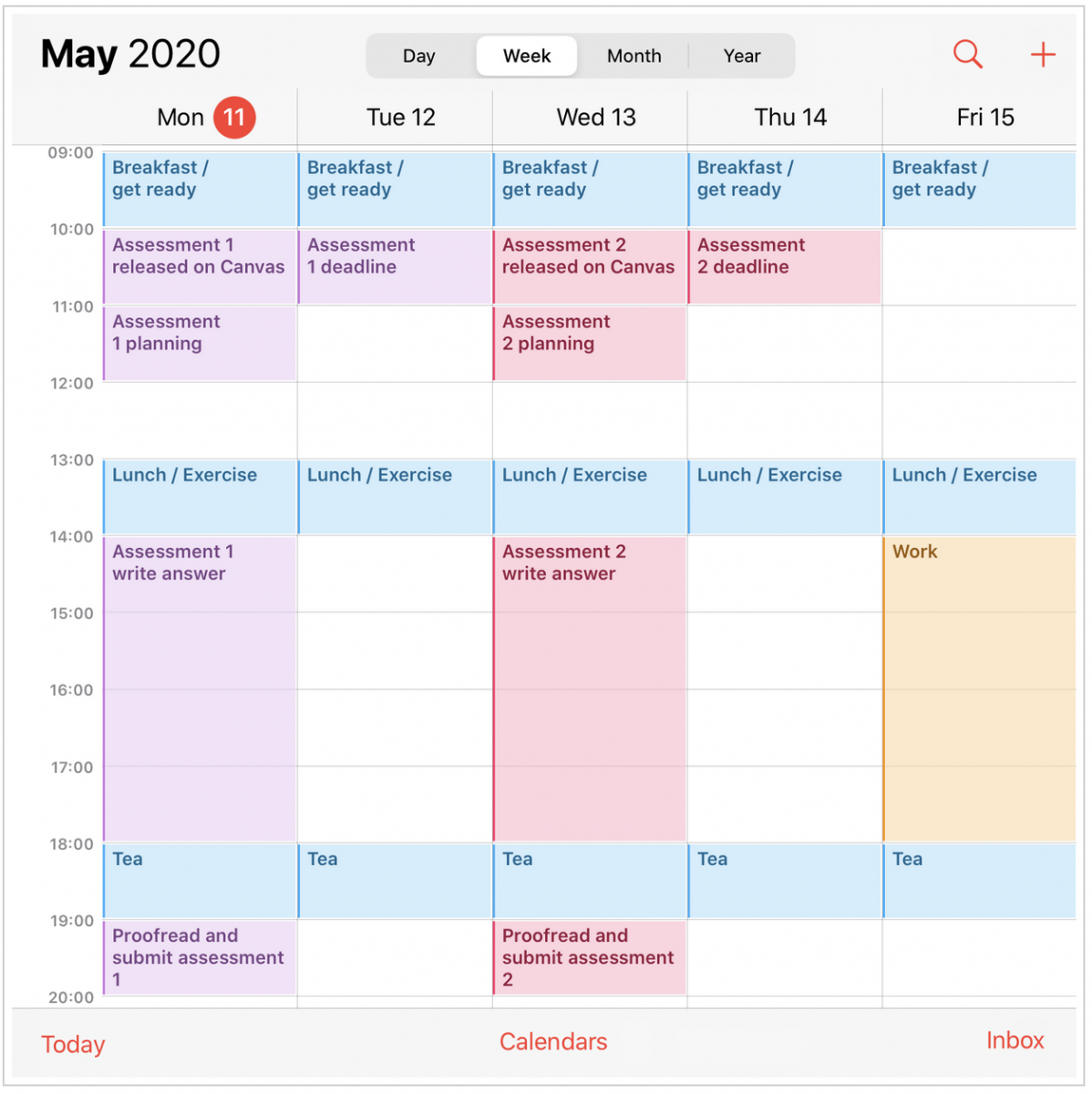
- Text only version for the five-step guide above
Starting with a blank weekly calendar, add the following:
Step 1
Put in assessment release and submission dates
The first thing to go into your plan should be the dates and times you expect to receive your assessment and the deadlines when these need to be submitted.Step 2
Add your other essential activities
Add the time you need for work, eating, exercise and other responsibilities and be realistic about the time you need to dedicate to these. You may also have other coursework deadlines to consider.Step 3
Add time to write your answer
You may have been provided with timings for how long to spend on writing the answer to each question, so add that in with enough time before the deadline.Step 4
Add some planning time
Put aside some time to plan your answer and go through your notes. If you have prepared well in the weeks beforehand, this should not take too much time.Step 5
Allow time to proof-read
Take advantage of the time available to proofread your response before you submit it. Try not to leave the submission until the last possible minute and make sure you know who to contact if you have technical issues.
Effective revision strategies
Recognition versus recall
Think of your favourite film. You can probably imagine the plot, the characters, the actors and one or two of the best scenes. If you saw just a couple of minutes of the film, could you recognise when this movie was on the television? If you heard some dialogue, could you confidently say if it came from your movie or not?
The answer is almost certainly yes. This is easy. It is recognition of something you are watching or hearing. In the same way that you can recognise your favourite film from a poster, you can probably recognise the main ideas of your academic subject when you see them.
 Sussex students working in a study pod
Sussex students working in a study pod
Now, think about your film again. Do you know what all the lines are in the best scene? Do you know what each character is wearing at the start of the movie? Can you name not only the director, but the producer, the cinematographer and the make-up artists?
This is much more difficult. This is recalling the details of the film, without looking at it. Recalling facts and information is much more taxing for our brains because we don’t have the material in front of us as a prompt. But in exams, we need to recall, rather than simply recognise.
This is important because the best revision techniques actively help you to recall information, rather than just passively recognise it when you see it. Make sure when you revise that you are training your memory to recall facts.
Passive revision techniques
Be aware that the following are passive revision techniques that only aid in increasing your recognition of information. Check that you aren’t doing them!
- Reading through your notes, your past assessments and key texts. If you are not doing anything with the material, then this is not very helpful for remembering what you read.
- Typing out all your notes. This can seem very useful as you are keeping busy, but it is mostly a waste of time since it it does not require much brain activity or engagement.
- Highlighting information in texts. It can be very easy to mindlessly over-highlight most of a document, but unless you do something with the highlights, you are relying on having the text in front of you.
- Listening to lecture recordings. If you simply listen to a lecture that you have heard before, you probably won’t take in anything more than you did the first time!
Check out these Top 10 Revision Tips!
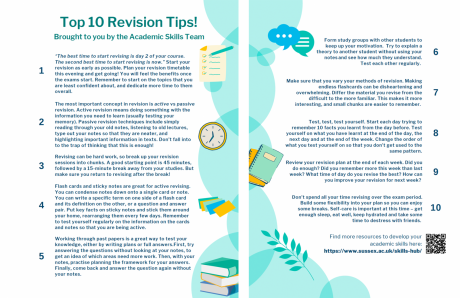
You can download this Top 10 list as a Word document or PDF to print out or to save for future use, There is a text only version below (Important: The PDF will open in this window so remember to click on the browsers back button to return to the Skills Hub).
- Top 10 Revision Tips! (text only version)
Top 10 Revision Tips! Brought to you by the Academic Skills Team
1. “The best time to start revising is day 2 of your course. The second best time to start revising is now.” Start your revision as early as possible. Plan your revision timetable this evening and get going! You will feel the benefits once the exams start. Remember to start on the topics that you are least confident about, and dedicate more time to them overall.
2. The most important concept in revision is active vs passive revision. Active revision means doing something with the information you need to learn (usually testing your memory). Passive revision techniques include simply reading through your old notes, listening to old lectures, type out your notes so that they are neater, and highlighting important information in texts. Don’t fall into to the trap of thinking that this is enough!
3. Revising can be hard work, so break up your revision sessions into chunks. A good starting point is 45 minutes, followed by a 15-minute break away from your studies. But make sure you return to revising after the break!
4. Flash cards and sticky notes are great for active revising. You can condense notes down onto a single card or note. You can write a specific term on one side of a flash card and its definition on the other, or a question and answer pair. Put key facts on sticky notes and stick them around your home, rearranging them every few days. Remember to test yourself regularly on the information on the cards and notes so that you are being active.
5. Working through past papers is a great way to test your knowledge, either by writing plans or full answers.First, try answering the questions without looking at your notes, to get an idea of which areas need more work. Then, with your notes, practise planning the framework for your answers. Finally, come back and answer the question again without your notes.
6. Form study groups with other students to keep up your motivation. Try to explain a theory to another student without using your notes and see how much they understand. Test each other regularly.
7. Make sure that you vary your methods of revision. Making endless flashcards can be disheartening and overwhelming. Differ the material you revise from the difficult to the more familiar. This makes it more interesting, and small chunks are easier to remember.
8. Test, test, test yourself. Start each day trying to remember 10 facts you learnt from the day before. Test yourself on what you have learnt at the end of the day, the next day and at the end of the week. Change the order of what you test yourself on so that you don’t get used to the same pattern.
9. Review your revision plan at the end of each week. Did you do enough? Did you remember more this week than last week? What time of day do you revise the best? How can you improve your revision for next week?
10. Don’t spend all your time revising over the exam period. Build some flexibility into your plan so you can enjoy some breaks. Self-care is important at this time – get enough sleep, eat well, keep hydrated and take some time to destress with friends.
Active revision techniques
Read the seven sections below and consider which techniques may suit you the best.
- Flashcards
Flashcards allow you to practise summarising information and can help you identify any gaps in your learning. You can use them in a variety of different ways:
- Condense notes about a specific topic on to a card.
- Write a term on one side and a definition the other.
- Write a question on one side and the answer on the other.
 Example image of flash cards
Example image of flash cardsThe most important use of flashcards is to test yourself! Don’t just read them, actively hide the answers so you are practising recall. Ask your friends and flatmates to test you.
Include colours and images to improve your memory, but don’t spend more time making them pretty than testing your recall of the information. There are also lots of apps available to create flashcards. - Rhymes, stories or mnemonics
Use songs, rhymes or stories to learn facts, e.g. "Horace fell down a well and started laughing". (Horace Wells was an American dentist and one of the first to routinely use nitrous oxide/laughing gas on his patients)
Mnemonics can also be a helpful way to memorise facts. Use the first letter of a series of words to create a phrase that is easy to remember. For example, emergency responders remember the symptoms of a heart attack through the mnemonic PULSE:
Persistent chest pains, Upset stomach, Lightheadedness, Shortness of breath, Excessive sweating.
- Sticky notes
Sticky notes are good for summarising information and remembering key details. Use colours to identify themes and stick them around your home - but move them regularly so you don't get used to having them in a specific place.
- Practice questions
If you can access past papers or practice questions, working through these is a great way to test your knowledge, either by writing plans or full answers, First, try answering the questions without looking at your notes, to get an idea of which areas need more work. Then, with your notes, practise planning the framework for your answers. Use lists to compare points for and against a statement. Finally, come back and answer the question again without your notes.
You can search for previous examination papers from your subject area. To use the past papers system you'll need to log in with your ITS username and password. - Study groups
Revising as a group can give you an opportunity to quiz and test each other. Have a go at explaining topics to others without referring to your notes. It’s a great way to aid your own memory and understanding.
 Sussex students working in a group at the student centre
Sussex students working in a group at the student centre - Mind maps and other notes
Mind maps can be a great way to identify connections between ideas. Use colours and images, which will aid your memory. You may find drawing diagrams useful to remember processes or cycles.
 How-to-mind-map by Lex McKee is licensed under CC BY-NC 2.0
How-to-mind-map by Lex McKee is licensed under CC BY-NC 2.0 However, do not just create a mind-map from your notes and look at it. Do something with it. Test what you can remember from the mindmap. Can you recreate it without looking at it? Can you summarise the concepts even further to help you memorise them? Can you add remember examples for each of the nodes?
- Spread out your tests
Test yourself on the same material at the end of the day, the next day and at the end of the week. Change the order of what you test yourself on so that you don’t get used to the same pattern.
Georgia talks about her revision techniques and how to prepare
- Video transcript
Georgia: Exams are definitely quite overwhelming. For me, I tend to like revision cards. They tend to work quite well for me. I sort of [it's] -a big process - you have so much information and about condensing it down to the core parts of the information that you need to know and the core studies that back up the evidence of the things - key evidence that backs up the theories that we're talking about and discussing. And that's how I tend to revise. But for some subjects, I found that just it didn't work for me. For example, in Psychobiology, there are a lot of diagrams and I find it one of the more complicated aspects of Psychology. I just couldn't understand the stuff without the diagrams, and I needed more to it. So I got A3 pieces of paper and drew the diagrams and wrote information around it. That was another way that I found of condensing information. But it definitely also depends on the type of exam. So for first year, I had multiple choice questions, so the revision cards worked really well for me. But this year I have more essay-based exams and they required me a bit more to make connections between theories and critical evaluation and things like that. So I did more mind maps because that helped me connect things together and I could see the evaluation and how it flowed and I could see how an essay could be written through that a lot better than just sort of the key facts, which is a bit better for multiple choice exams.
Keeping motivated while revising
Revision is not the most exciting part of studying but it is important. Here are some tips to keep you going! Check out the advice on procrastination in Time Management if you are having trouble starting.
- Keep in mind throughout the year that what you learn, you will need to revise later. Make sure your notes are clear and memorable. Make flashcards as you go rather than just in the revision period. The earlier you start, the less you will have to do later.
- Build up how many hours you spend revising in a day.
- Vary the material you revise from the difficult to the more familiar. This makes it more interesting, and small chunks are easier to remember.
- Vary your methods of revision. Making endless flashcards can be disheartening and overwhelming.
- Aim to revise for short 45-minute sessions followed by a 15-minute break. Reward yourself with fun stuff in your break so you will be more likely to stick to your schedule!
- Even when you are on a break, your mind will keep working - often sorting out complex ideas!
- Be strict about returning to your revision after a break.
- If you're revising independently at home, it can be a struggle to remain productive. It is important to establish a routine - set an alarm, get dressed and eat breakfast as you normally would to prepare for the day.
- Studying with other people can really help keep up motivation. Just be sure to stick to revision and not distract each other!
- Keep notes and flashcards with you at all times, so in short moments at the bus stop or waiting in a queue you can test yourself for a minute or two.
- Challenge yourself to remember 10 facts from your revision session the day before. Build up this number over time.
- Make sure you are sleeping and eating well and getting time away from revision so that you are stronger and more motivated when you return.
 Sussex students relaxing and talking on campus
Sussex students relaxing and talking on campus
Exam techniques
The best way to do well in exams is to make sure you are well prepared and have done your revision. That said, there are things that you should be doing in the exam to perform as strongly as possible. They may seem obvious, but many students forget to do them under the pressure of a timed assessment.
This advice comes from experienced examiners.
- Check your technology
If you have online assessments, check all the technology requirements beforehand:
- Do you need to install any software?
- Do you need to adjust any settings on your device?
- Do you have a strong enough internet connection?
- Do you know what to do if you have technical issues?
If you need help with your technology contact ITS
Read the instructions
Make sure you are clear about how many questions you need to answer. If questions are divided into multiple sub-questions, check whether you have to answer any one of the sub-questions or all of them. Check the back of the paper for further questions/sections.
 Activity: Choosing which questions to answer
Activity: Choosing which questions to answer
You may be given a choice of questions to answer. Look at the four sentences below and put them in the correct order, this will help you choose which questions to answer (there is a text only version below the activity):
- Text only version for the activity above (with answers)
There are four sentences below in an incorrect order, you need to think about what order they should be in:
a. Underline the key words or phrases. Don't pick a question which contains any terminology you do not fully understand.
b. Write down a few notes and ideas if you aren't sure between question to choose. This should help you see which question you could write a better answer for.
c. Read all your options carefully before choosing.
d. Make sure you understand what the question is asking you.
Below are the four sentences now in the correct order:
1. Read all your options carefully before choosing.
2. Make sure you understand what the question is asking you.
3. Underline the key words or phrases. Don't pick a question which contains any terminology you do not fully understand.
4. Write down a few notes and ideas if you aren't sure between question to choose. This should help you see which question you could write a better answer for.
Check how many marks are available
Check how many marks are available for each question. If the same number of marks is available for each question, then make sure you allocate roughly the same amount of time to each. Don't spend so much time answering your favourite question that you write only scrappy notes for the other questions you choose.
Plan your time
Plan the time you can spend on each individual question. You should aim to complete your answers well before the close of the exam, but it is wise to use any extra time you have to re-read your answers and correct any mistakes.
Essay-style exams
These exams often give you a choice of questions to answer, all of which require an essay-style response to demonstrate your knowledge and understanding. You are expected to provide evidence to support the points you make, structure your response and communicate your thoughts in a clear, concise and logical way. Pay careful attention to any word limits or other instructions provided on the paper.
Short-answer exams
With a short-answer exam paper, you are likely to have several questions to answer. Questions which carry more marks will require more detail and more of your time. Make sure you leave yourself enough time to answer these.
Plan each answer before you start writing
Jot down skeleton plans on a page which you can later cross out as rough work, before writing the actual answers to be read by the examiners. This will help you to make sure your answer is clearly structured.
Note from the examiner:
Most students believe, incorrectly, that your mark depends mostly on the number of correct facts in the answer. On the contrary, the logic, clarity and organisation of the work are at least as important as its content.Answer the question
Make sure you answer the question that is on the paper and not the one you hoped would be there! Underline any directive, topic or limiting words in the question to make sure you focus on exactly what you are being asked.
Note from the examiner:
The most common fault in any written work is a failure to keep to the point and not to answer the question. When you write an examination answer or an essay you are engaged in an assessment of what is relevant. What does the question ask?Name the key thinkers/experts
When you discuss ideas/techniques associated with specific individuals, mention their name and if possible, give an indication of the book or article title.
Give examples
If applicable, illustrate theories with concrete examples.
Note from the examiner:
If there is a stock example which the textbooks or the lectures always quote, give a different example if you can. Quoting a stock example just shows that you have remembered it. Quoting a different example (provided it is a true example of the issue it is used to illustrate) shows that you have understood that issue well enough to identify an example for yourself; it is much more impressive.Multiple choice questions (MCQs)
MCQ exams are very different to written exams. Often the marks are evenly weighted for all the questions. But some are bound to take you longer than others to answer.
- Read the instructions carefully.
- Read through all the questions quickly answering all the ones you definitely know first and leaving the hard ones until last.
- Try to think of the answer before you look at the choices.
Formulas and equations
Write down any working out in a clear logical order - it could get you some marks even if your final answer is wrong. If you find yourself running out of time and unable to work through to the answers, write down which formulas you would have used to get there.